
AIMS Energy
Scope & Guideline
Advancing Innovations in Energy and Sustainability
Introduction
Aims and Scopes
- Renewable Energy Technologies:
This includes solar, wind, biomass, and hydro energy systems, emphasizing innovations in design, efficiency, and integration into existing grids. - Energy Management and Optimization:
Research on optimizing energy systems, including smart grids, energy storage solutions, and demand response strategies to enhance efficiency and reliability. - Sustainable Energy Development:
Focus on the socio-economic and environmental impacts of energy systems, promoting practices that ensure sustainability and resilience in energy production and consumption. - Energy Policy and Economic Analysis:
Studies that evaluate policies, market dynamics, and economic models related to energy production and consumption, contributing to informed decision-making. - Technological Innovations in Energy:
Exploration of new technologies and methodologies for energy generation, storage, and consumption, including advancements in materials and systems. - Bioenergy and Waste-to-Energy Solutions:
Research dedicated to the conversion of biomass and waste into energy, addressing challenges and opportunities in biofuel production and waste management.
Trending and Emerging
- Integration of Renewable Energy Sources:
There is a growing focus on integrating multiple renewable energy sources, such as solar and wind, into hybrid systems that enhance reliability and efficiency. - Smart Grids and Energy Management Systems:
Research is increasingly centered around smart grids that utilize IoT and AI for better energy distribution and consumption management. - Hydrogen Economy and Fuel Cells:
The exploration of hydrogen as a clean energy carrier and the development of fuel cells for various applications are gaining momentum in recent studies. - Energy Storage Technologies:
Significant attention is directed towards innovative energy storage solutions, including advanced battery technologies and thermal storage systems, to support renewable energy integration. - Climate Change Mitigation Strategies:
Research emphasizing the role of energy systems in addressing climate change, including carbon capture and utilization technologies, is on the rise. - Circular Economy in Energy Systems:
Emerging studies focus on the circular economy principles applied to energy systems, promoting sustainability and resource efficiency in energy production and consumption.
Declining or Waning
- Conventional Fossil Fuel Technologies:
There has been a noticeable decrease in studies related to traditional fossil fuel technologies, as the focus shifts towards renewable and sustainable alternatives. - Energy Systems Based Solely on Non-Renewable Sources:
Research that does not integrate renewable components or hybrid systems is becoming less prevalent, reflecting a trend towards more sustainable energy solutions. - Ethanol and Biofuel Production from Traditional Sources:
While biofuels remain a key area, there is a decline in research centered on conventional sources like corn and sugarcane, as focus shifts to more diverse and sustainable feedstocks. - General Energy Consumption Studies:
Studies that merely analyze energy consumption without a clear link to efficiency improvements or sustainable practices are becoming less frequent. - Single-Focus Technological Innovations:
Research that solely focuses on isolated technological advancements without considering their integration into broader energy systems is decreasing.
Similar Journals
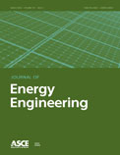
JOURNAL OF ENERGY ENGINEERING
Driving Research in Energy Systems and SustainabilityJOURNAL OF ENERGY ENGINEERING, published by the ASCE-Amer Soc Civil Engineers, serves as a pivotal resource in the fields of civil and structural engineering, energy engineering, and nuclear energy research. With an ISSN of 0733-9402 and an E-ISSN of 1943-7897, this esteemed journal demonstrates a consistent commitment to advancing knowledge in energy systems, sustainability, and waste management. Ranking within the second quartile in several categories—including Civil and Structural Engineering and Energy Engineering and Power Technology—this journal maintains a strong reputation, underscored by its Scopus rankings that place it in the top tiers of its discipline. Accessible from 1982 through 2024, the journal provides researchers and professionals meaningful insights through rigorously peer-reviewed articles, critical reviews, and case studies that address contemporary challenges in energy utilization and infrastructure development. Without open access options, it ensures the integrity and credibility of published work, showcasing influential research that contributes to sustainable solutions in energy and environmental frameworks. Researchers, professionals, and students alike will find the JOURNAL OF ENERGY ENGINEERING an indispensable platform for exploration and dissemination of innovative ideas within the realm of energy and engineering.

Journal of the Japan Institute of Energy
Connecting Ideas to Energy Solutions.Journal of the Japan Institute of Energy, ISSN 0916-8753, is a reputable academic journal dedicated to the field of energy studies, reflecting the dynamic and evolving landscape of energy research. Published by the Japan Institute of Energy, the journal serves as a platform for disseminating innovative research, technologies, and methodologies related to energy engineering, renewable energy sources, and sustainability practices. While this journal does not currently offer open access, it remains a vital resource for professionals, researchers, and students alike, particularly those focused on advancing knowledge within Energy Engineering and Power Technology, Fuel Technology, and related areas. As of 2023, it is ranked in the Q4 quartile across several categories in Scopus, which highlights its foundational role in fostering scholarly discourse, despite its lower ranking in the competitive global landscape. Established in 1990 and continuously evolving, the journal provides insights into the challenges and innovations in the energy sector, making it an essential read for anyone invested in the future of energy solutions.

Global Energy Interconnection-China
Empowering Sustainable Solutions for a Greener TomorrowGlobal Energy Interconnection-China is an esteemed Open Access journal published by KEAI PUBLISHING LTD that focuses on the rapidly evolving fields of energy engineering and power technology. Since its launch in 2018, the journal has become a vital resource for researchers and professionals interested in sustainable energy solutions and innovative technologies, addressing the critical challenges facing the global energy landscape. With an impressive Q2 categorization in multiple engineering and energy-related disciplines, the journal ranks highly in Scopus, positioning itself as a leading platform for disseminating impactful research. Specifically, it excels in Automotive Engineering and Control and Systems Engineering, as evidenced by its competitive standing within the top quantiles of its fields. By leveraging its open access model, Global Energy Interconnection-China ensures that high-quality research is accessible to a worldwide audience, fostering collaboration and advancements in renewable energy, sustainability, and environmental conservation. For researchers, professionals, and students alike, this journal serves as a pivotal forum for sharing insights and innovations that shape the future of energy interconnection.

Journal of Power Technologies
Driving Efficiency in Energy Production and TransmissionJournal of Power Technologies is a prestigious academic journal dedicated to advancing the field of power engineering, specifically focusing on innovative technologies and methodologies related to energy production, transmission, and efficiency. Published by the renowned Warsaw University of Technology, Institute of Heat Engineering, this journal is committed to disseminating high-quality research that addresses the challenges and opportunities in the energy sector. Although currently not open access, the journal provides extensive subscription options for access to its comprehensive range of articles. With an emphasis on original research, case studies, and reviews, the Journal of Power Technologies serves as a vital resource for researchers, practitioners, and students alike, aiming to shape the future of sustainable power systems and contribute significantly to the global energy discourse. The journal continues to foster an academic environment where innovation in power technology is highlighted and celebrated, supporting the ongoing quest for sustainable energy solutions.
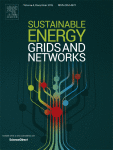
Sustainable Energy Grids & Networks
Empowering Innovation in Sustainable Energy SolutionsSustainable Energy Grids & Networks, published by ELSEVIER, stands at the forefront of research in energy systems, contributing significantly to the fields of Control and Systems Engineering, Electrical and Electronic Engineering, and Energy Engineering and Power Technology. With an impressive impact factor, this journal is ranked in the top quartile (Q1) for key engineering categories, affirming its authority and influence within the academic community. The journal is dedicated to publishing high-quality research focused on the sustainable integration of energy systems and smart grid technology, which is crucial in addressing the pressing challenges of climate change and energy consumption. Although it operates on a subscription model, the rigorous peer-review process ensures that only the most innovative and impactful studies are disseminated, promoting advancements in renewable energy and sustainability. As a critical resource for researchers, professionals, and students, Sustainable Energy Grids & Networks provides a platform for the exchange of ideas that drive the future of sustainable energy solutions, fostering collaboration and knowledge-sharing across disciplines.
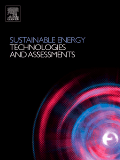
Sustainable Energy Technologies and Assessments
Contributing to a Sustainable Energy FutureSustainable Energy Technologies and Assessments is a prestigious journal published by ELSEVIER, based in the United Kingdom, focusing on the critical field of energy engineering and its intersection with sustainability. Since its inception in 2013, the journal has established itself as a leading platform for disseminating innovative research and assessments of sustainable energy technologies, earning a notable Q1 ranking in both Energy Engineering and Power Technology, as well as Renewable Energy, Sustainability, and the Environment. With an impressive Scopus ranking—#22 out of 272 in Energy Engineering and #40 out of 270 in Renewable Energy—this journal is essential for researchers and professionals seeking to advance their knowledge on cutting-edge developments and assessments in sustainable energy. Although the journal operates on a subscription basis, it remains committed to promoting high-quality research that aligns with global sustainability objectives. Researchers and students alike will find invaluable insights and data that shape the future of renewable energy technologies within these pages.
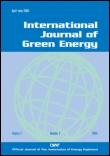
International Journal of Green Energy
Advancing sustainable solutions for a greener future.The International Journal of Green Energy is a premier publication that plays a pivotal role in the field of renewable energy and sustainability. Published by Taylor & Francis Inc, this journal, with ISSN 1543-5075 and E-ISSN 1543-5083, has established itself as a crucial platform for sharing innovative research and developments from 2005 to 2024. With a commendable Q2 ranking in the category of Renewable Energy, Sustainability and the Environment, it ranks 100 out of 270 in Scopus, positioning itself in the 63rd percentile of its field. The journal is dedicated to advancing knowledge and fostering dialogue around green technologies and sustainable practices, providing invaluable insights for researchers, industry professionals, and students alike. Although it does not offer open access options, the journal's commitment to rigorous peer review ensures that only high-quality research is published, making it an essential resource for those seeking to explore and understand the complexities of green energy solutions.

Frontiers in Energy Research
Illuminating the future of energy research.Frontiers in Energy Research is a prestigious open-access journal published by FRONTIERS MEDIA SA, dedicated to advancing knowledge in the diverse fields of energy research. Launched in 2013, the journal has established itself as a pivotal platform for disseminating high-quality research, particularly in areas such as Economics and Econometrics, Energy Engineering and Power Technology, and Renewable Energy, Sustainability and the Environment. With a notable impact factor and impressive quartile rankings, including Q2 in multiple categories and a reputation for rigorous peer review, Frontiers in Energy Research offers researchers, professionals, and students alike a vital resource for exploring the latest innovations and insights in energy studies. Operating from its base in Lausanne, Switzerland, this journal is committed to enhancing open accessibility to relevant research, significantly contributing to the global dialogue on energy solutions and sustainability.
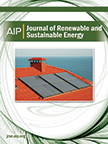
Journal of Renewable and Sustainable Energy
Pioneering Sustainable Solutions for a Greener FutureThe Journal of Renewable and Sustainable Energy, published by AIP Publishing, stands at the forefront of research in the fields of renewable energy and sustainable practices. With an ISSN of 1941-7012, this journal aims to foster innovative research and exchange of knowledge on sustainable technologies and methodologies that contribute to environmental conservation and energy efficiency. Achieving a prestigious Q2 ranking in the category of Renewable Energy, Sustainability, and the Environment, it ranks 135 out of 270 journals in Scopus, signifying its impactful contributions to the field. The journal, active from 2010 to 2024, provides a platform for authors, analysts, and practitioners to disseminate significant findings that can shape future environmental policies and energy frameworks. Although not currently an Open Access publication, it remains an essential resource for researchers dedicated to advancing sustainable development and energy solutions.
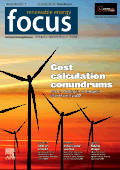
Renewable Energy Focus
Exploring Innovative Pathways in Renewable EnergyRenewable Energy Focus is a premier journal published by Elsevier, dedicated to advancing the field of renewable energy and sustainability. With an ISSN of 1755-0084 and an E-ISSN of 1878-0229, this journal serves as a vital platform for researchers, professionals, and students interested in innovative solutions to energy challenges. Established in 2007, the journal has evolved to become a recognized authority in the subject area, currently ranked in the Q2 quartile of its category for 2023, emphasizing its significance in promoting impactful research. The journal encompasses a wide range of topics, including solar, wind, bioenergy, and sustainable practices that contribute to environmental conservation and energy efficiency. As part of Elsevier's commitment to disseminating high-quality research, Renewable Energy Focus is indexed in Scopus, currently holding a rank of #92/270 in the energy sector, positioning it in the 66th percentile of its field. This journal offers an essential resource for those dedicated to fostering sustainable energy solutions.